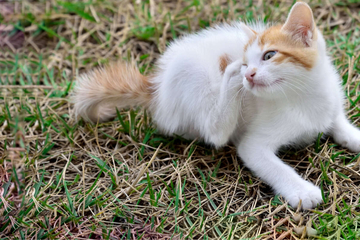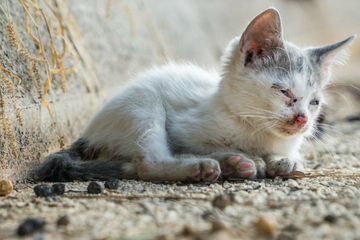Herbs for cats: Safe and dangerous cat herbs
You might have noticed that your kitty likes to munch away on plants from time to time. Even some kitchen herbs cannot escape your cat's wrath, but are they harmless to felines? What cat herbs are dangerous and safe, and when should we be concerned for their health?
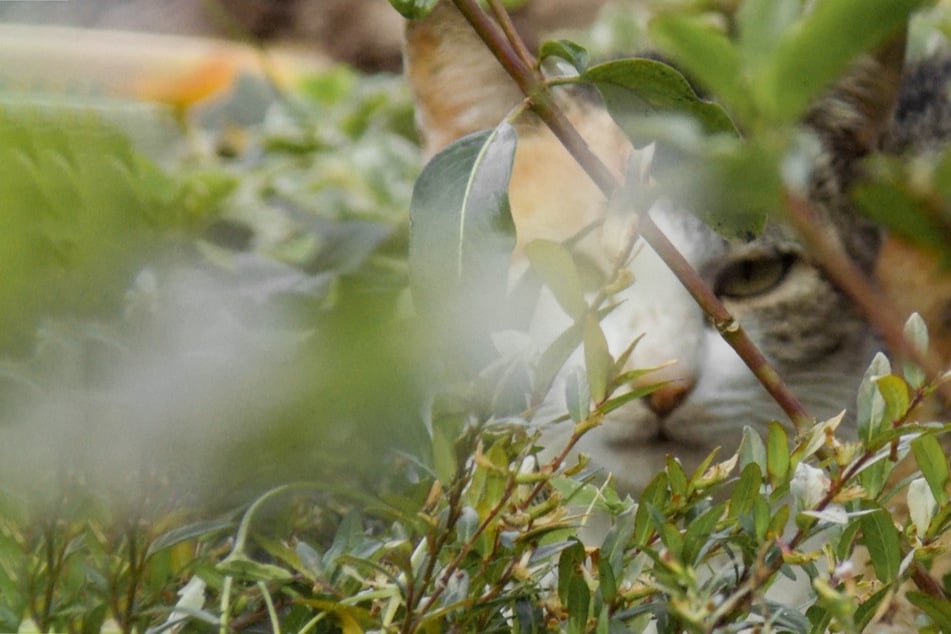
At some point, all cat owners have been left wondering, "Why is my cat eating herbs and plants?" Though it's a rather odd sight, your kitty happily munching away on plants is not something to be worried about. While some herbs can be dangerous for your cat, most are harmless.
Certain herbs and plants can actually provide your cat with relief from digestive problems and infections. These do not, under any circumstance, substitute good veterinary care, but are perfectly safe for your feline friends to nibble on.
If you make the decision to start getting herbs for your cat, make sure to double-check with your vet before making any investments.
Are you curious about herbs for cats, and why they seem to always love munching on them? In this cat guide, we will take you through everything you need to know about cat herbs.
Should I get herbs for cats?
A healthy diet undoubtedly helps your cat stay healthy. Of course, these little fuzzballs eat predominantly meat, but that doesn't mean that they won't dive into a tasty vegetarian option if they so desire. The question, of course, is whether this is a healthy option, or if it's a reason for concern.
Cats need a healthy supply of vitamins, minerals, and other things that can sometimes be hard to find in meat-based cat food. In these cases, cats will seek out particular plants and herbs to get those additional nutrients.
We're not talking about cat grass here, but rather herbs that are eaten and digested by our feline friends. Cats have sensitive stomachs and noses and will seek out things to fulfill their nutritional requirements and digestive health.
Cat herbs should only be used medically at the discretion of your vet, as certain cats' herbs can be dangerous. This is especially true for cats who have kidney problems. Additionally, while many herbs are healthy for cats, some are dangerous and potentially poisonous.
To ensure that the herbs your cat is consuming serve a healthy purpose and don't harm them, consult with your veterinarian.
Please note: If you find your cat feasting on a dangerous herb, take them to a vet immediately and make sure to remove the herb from your garden or house as soon as possible.
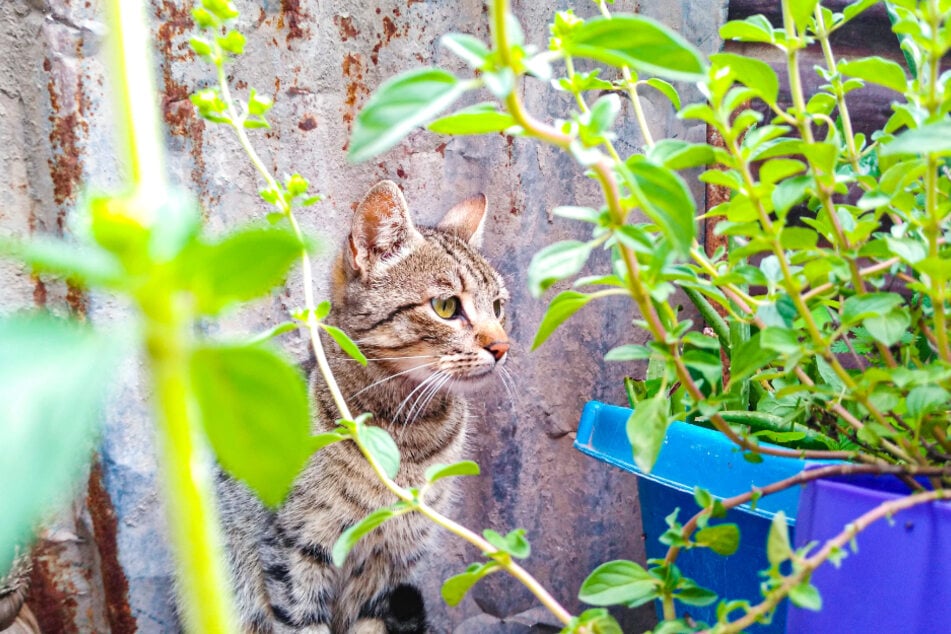
What herbs are safe for cats?
There are two main categories that safe cat herbs can be divided into. These two categories are quite simple: herbs that are good for a cat's diet and herbs that cats just simply enjoy. Neither of these categories is without risks, of course, so all veterinarian advice should be followed. Now, let's take a look at those two categories.
Safe herbs that are good for a cat's diet
Some herbs incur a lot of cat happiness, and others benefit a cat's health through its diet.
Basil
Cats don't actually like basil that much, but it can help them with many things. In the short-term, the consumption of basil can help cats that suffer from flatulence or urinary tract infections.
Nettle
Nettles are rich in vitamins and minerals and provide a deacidifying and detoxifying effect. As a result, nettles help to strengthen a cat's immune system and improve its metabolism. On top of this, nettles are anti-inflammatory, which highly benefits cats with osteoarthritis. With that being said, nettles should never be given to a cat with kidney or heart problems, and should only be used in their dried or cooked form.
Watercress
If your cat hasn't been eating much, nibbling on some watercress can stimulate their appetite and get them excited for dinner. However, while watercress is generally pretty safe, if it's consumed in large doses it can cause unpleasant gastrointestinal issues.
Rose hips
After smashing rose hips into a fine powder, they can be given to your cat to support their skin, gums, joints, tendons, and muscles. This cat herb will also help improve cats' immune systems.
Chamomile
Chamomile can be used to reduce inflammation and fight bacteria in cats. Most importantly, this herb can help cats with diarrhea, gastrointestinal problems, and fungal problems, and can also help heal wounds. Just remember to never let chamomile come into contact with a cat's eyes, and to keep the dose in moderation.
WARNING: In large amounts, chamomile can make cats very sick. Please consult your vet before use.
Cat grass
Cats munch on cat grass to help regulate their digestion and to make it easier to vomit up hairballs. This is not one single herb, but a combination of different plants that can be used to keep your cat healthy and happy.
Dandelion
Dandelion has a blood purifying effect in cats and can help with diseases of the pancreas. You may notice your cat eating this particular herb in the garden. If you do, it could indicate they aren't feeling well.
Rosemary
Rosemary can be used as an antibacterial, an antioxidant, and as a stimulant. However, the problem is that cats generally don't like rosemary, and often turn their nose up at it when it's added to their food.
Lemongrass
Cats with gastrointestinal problems, bacterial diseases, or fungal infections can reap fantastic benefits from eating a small amount of lemongrass.
WARNING: If used as an essential oil, lemongrass is potentially deadly for cats, so make sure that you only let your cat nibble on a small amount of the actual herb, and never use essential oils.
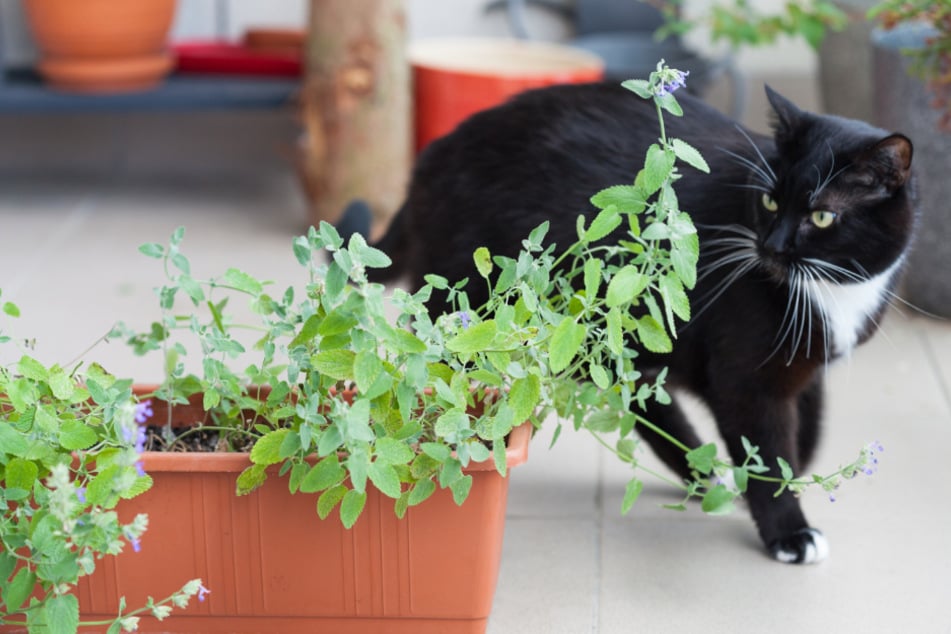
Cat friendly herbs that they enjoy
The following herbs might not be great for your cat's diet, but are loved by cats. Let's take a look:
Valerian
Cats are actually stimulated by valerian due to the acid within the herb. This stuff triggers a sexual response from cats. As a result, it's best not to constantly expose your cat to valerian.
Cat Chamomile
Cats absolutely adore the smell of cat chamomile, and they often like to rub themselves up against the plant. This gives your kitty a sense of momentary euphoria, and your cat will even chow down on the stuff from time to time.
Catnip
Catnip should not be mixed up with cat grass, as it is very different. This herb has a stimulating, activating effect on cats, making them want to rub on and lick the plant. Cats do, however, get tired and aggressive from overexposure to catnip. Because of this, the herb should only be supplied in moderation.
Matatabi
Matatabi is also known as Japanese Catnip, and sends cats into a state of euphoria when consumed. In addition, this cat herb can stimulate their appetite, reduce their stress, and help regulate their blood pressure.
Lavender
Lavender provides a relaxing and calming effect on cats, but should not be consumed in a high quantity. It's best used as an aromatherapy against vermin like fleas and ticks. Keep in mind that lavender can be very bad for your cat if over-consumed. As usual, it's best to consult with your vet before use.
Can I get a medicinal cat herbs list?
There are a variety of herbs that provide medicinal benefits for cats, but it is best to talk to a veterinarian before using any of them. Many of the herbs described as good for a cat's diet also contain medicinal properties that can be greatly beneficial to your cat and help them combat diseases and illness. Contact your veterinarian for further guidance on how to use cat herbs medicinally.
What to consider when collecting herbs for cats
You don't need to go about buying expensive herbs from a pet shop, as you can often collect them in the wild or grow them yourself. However, this method is less controlled than simply buying a product that's designed for cats.
If you're going to collect herbs for cats yourself, please consider the following points:
- Make sure that you are collecting the right herbs and double check that you're providing the right stuff to your cat.
- Only harvest the required amount of herbs so that you don't destroy the natural ecosystem.
- Do not collect herbs from the wild, where you don't know the exact variation of the plant species.
- Make sure that any herbs that are collected and given to your cat are free of insecticides, herbicides, fungicides and artificial fertilizers.
- Be sure to collect high quality herbs and refrain from taking them from the side of the road, while on dog runs, or from the edge of fields.
- Most herbs should be collected during spring and summer.
- Always wash the herbs before giving them to your cat.
Hot tip: Consider making a herb garden specifically for your cat, containing several plants including cat grass, catnip, and rosemary. You can put this on a balcony or window sill, easily accessed by your kitty. It is decorative and protects your other houseplants from the cat. Great, right?
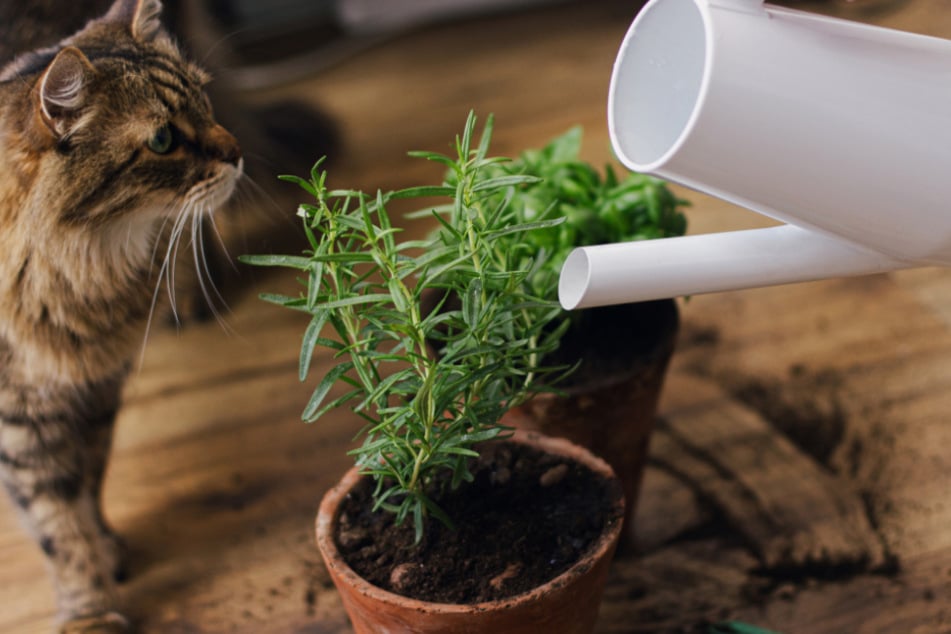
Toxic herbs for cats, what herbs are dangerous for cats?
There are many herbs that are actively dangerous for cats. Be sure to note the caveats we have provided for the suggested herbs above. Many herbs are actually safe in very small doses, but extremely dangerous in concentrated forms or when over-consumed.
Here are a few herbs that are considered toxic to cats:
- Oregano
- Marjoram
- Tarragon
- Cannabis
- Bay Leaf
- Spring Parsley
- Mint
- Chives
- Onion
- Garlic
- Mace
- Lemon Verbena
- Cocoa
- Sorrel
Though many of these herbs aren't fatal to cats unless consumed in large quantities, if your cat is found to have eaten any of these herbs, you should take it to the vet as soon as possible.
Correct dosage of herbs for cats
Herbs should be used in moderation, as many can have adverse reactions if your kitty consumes too much. Small amounts often provide the results you're searching for, but too much can lead to digestive problems like vomiting or diarrhea.
You need to remember that your cat's stomach is extremely sensitive and primarily meant for the consumption of meat. If a cat eats lots of plants, then its stomach will not function correctly. Because of this, you should pay attention to the mixture and quantity of the herbs given to your cat.
Crushed herbs can be mixed into the cat's food, both fresh and dried, but you should make sure that the harvested herbs are completely free of any harmful substances, have been washed, and are of a good quality.
Before giving any herbs to a cat, you should first consult your veterinarian for advice on the correct dosage, the risks associated with particular herbs, and advice on how you should give it to your kitty.
Please note: Many ready-made cat foods already contain herbs and nutrients, making the addition of cat herbs completely unnecessary.
Use cat herbs with caution
Certain herbs can be eaten, but other herbs cannot and should not be eaten by your cat. As with anything related to pets, be very careful about what you give your kitty and consult your vet if you are ever uncertain.
Herbs can be great for cats and offer support for their health, but nothing should be ever administered medicinally without the consultation of a veterinarian!
Cover photo: Viviane Pasta / Unsplash
